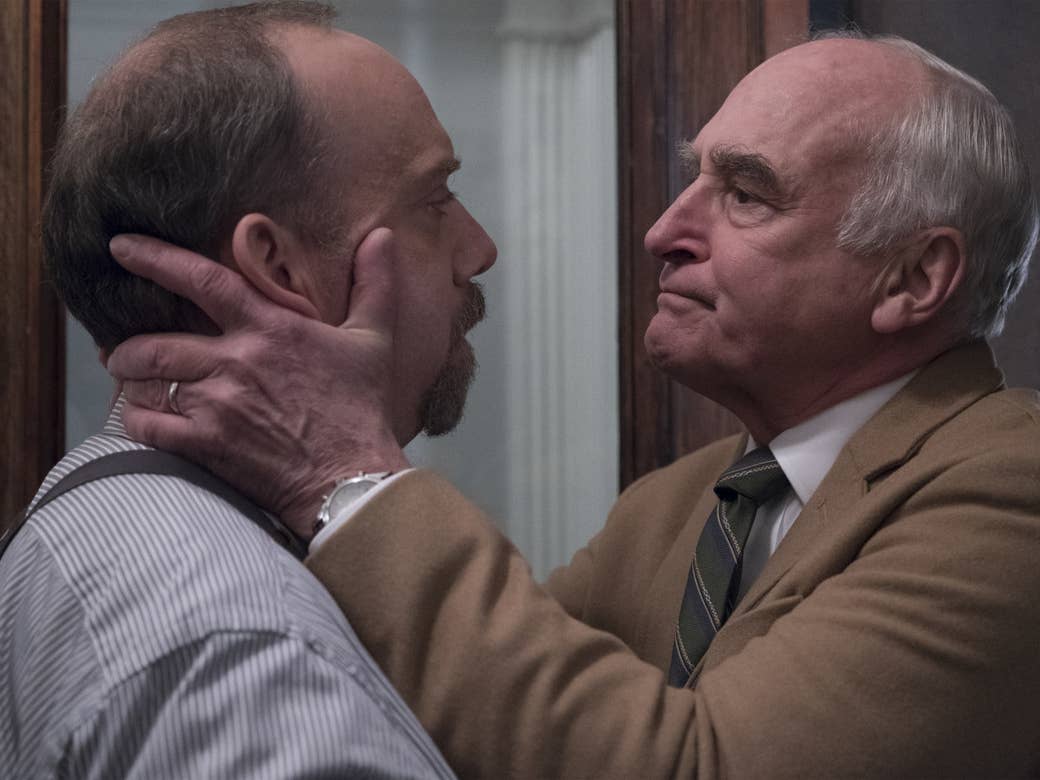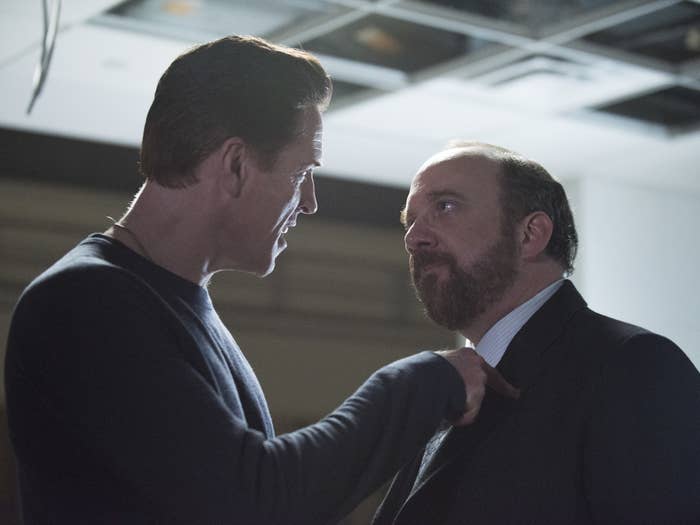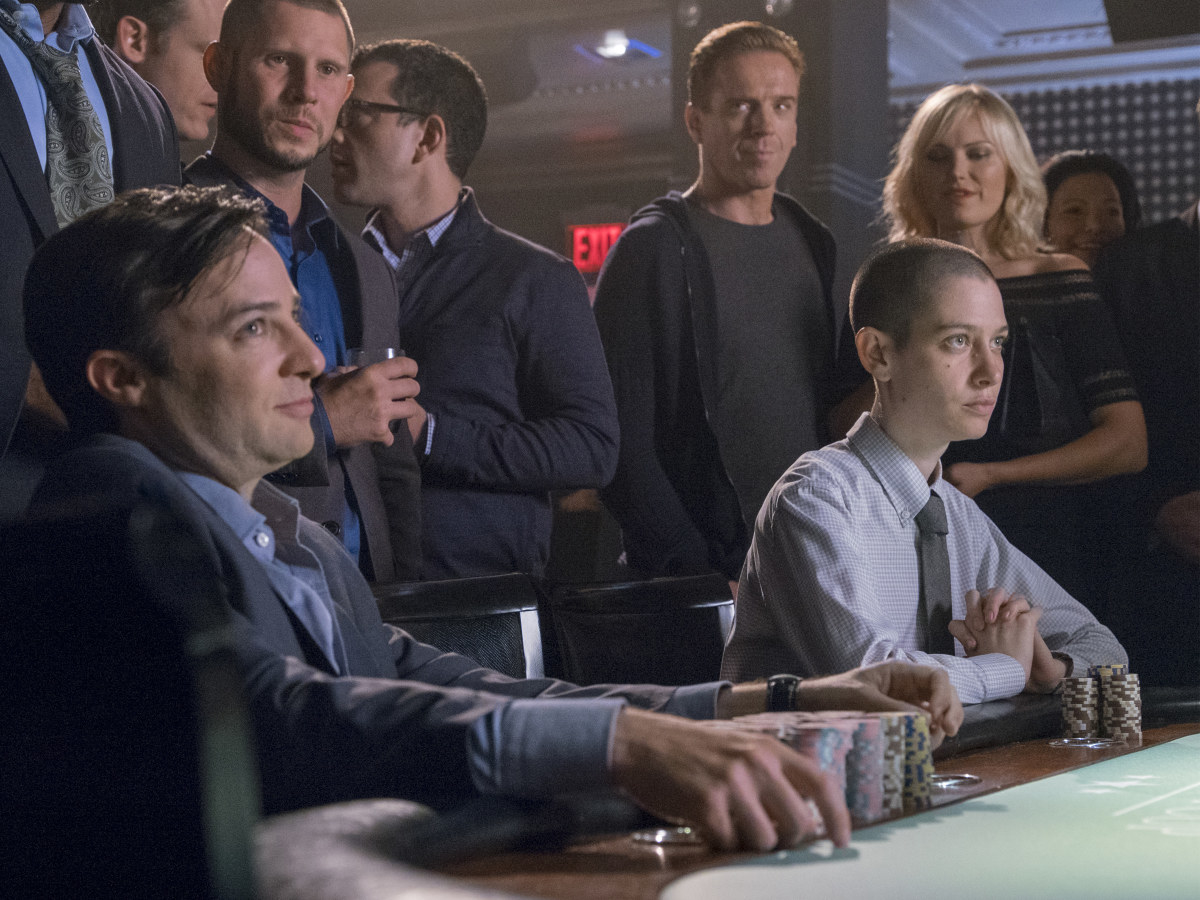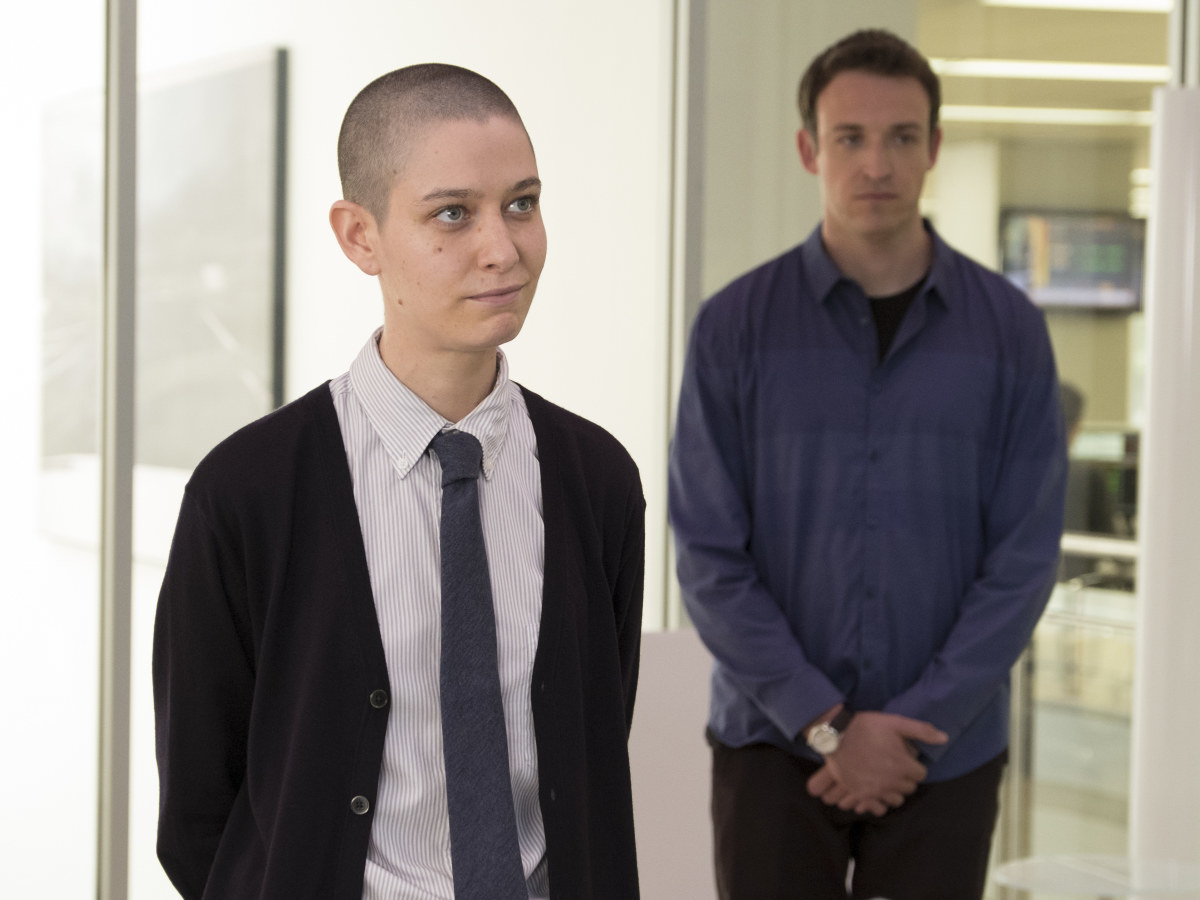
Dick is a multipurpose metaphor in Billions. Most of the characters in Showtime's hedge fund drama talk about their work, their success or lack thereof, and their stature as an extension of their virility. They aren't all men, but they do all circle a luxe locker room of an industry that's been overwhelmingly defined by men. Any observation you might feel inclined to make about Wall Street being dominated by bros vying to prove who has the biggest balls, Billions makes for you. In its very first episode, without the hint of a wink, a trader describes his issues at work to performance coach Wendy Rhoades (Maggie Siff) by using the language of erectile dysfunction: "I hear it happens to guys my age."
Exactly a season later, Wendy shakes a bottle of Viagra at an audience of hedge fund types, telling them that while some of them rely on it, none would admit that: "The thought that someone might know you need help is worse than not getting the help you need. Still, when the time comes, when you need to pull the trigger on the buy or sell order, you better be hard as a rock and ready to go" — no Freudian subtext necessary. More recently, to really underscore the erection connection and the fragility that accompanies it, a character insists he would part with a fraction of his — "an inch off my dick" — if it meant he and his failing fund could get back in the game.
When Billions, the creation of Brian Koppelman and David Levien, premiered in 2016, it was a show that — much like its wilder cinematic sibling The Wolf of Wall Street — felt unwilling to commit to being either a critique or a celebration of the excesses and amoral schemes it was putting onscreen. When you wallow in dudes slinging their schlongs around without any apparent subversion, it tends to come across as endorsement, especially when considered through the fumes of the presidential election that followed the first season, in which macho posturing and cartoonish wealth carried the day. In its early episodes, especially, Billions could be taken for another variation on the "flawed but great man" drama, and an addictive but particularly sour one whose standards of greatness were questionable.

It's actually about two men — US attorney and rising political star Chuck Rhoades (Paul Giamatti), and hedge fund superstar and billionaire "man of the people" Bobby Axelrod (Damian Lewis) — and the series unfolds in the shadow of their kaiju battle. Chuck, who sets out to take down Axe for insider trading with the obsessiveness of Ahab chasing Moby (sorry) Dick, might nominally be on the side of "good," or at least the law, but Billions is quick to muddy this divide. With his aims to run for office, Chuck proves himself to be someone willing to cross lines to further his own interests, while Axe is shown to be, while far from innocent, not the worst offender in his ethically flexible industry — just the showiest target.
Three seasons in, Chuck and Axe are still duking it out, and what's striking is how much smaller their continuing struggle now makes them look — so very human-sized. They've lost relationships and fortunes to a conflict that was started, by Axe's own acknowledgment, for "dick-measuring purposes." Somewhere along its run, Billions snapped into focus from being a blurry drama about power to being an infinitely sharper one about gender. It’s a snappily paced, light-on-its-feet nightmare about pissing contests, bruised egos, and displays of dominance, and what happens when power and gendered behavior are so intertwined that they get openly treated as if they were one and the same.
Midway through its current season, Billions still couldn't be described as a critique of the finance world, or the political one that intersects with it — it regards them both with a clinical gaze, as structures that protect and serve themselves, resist consequences, and erode people’s ideals with rewards and compromises. Part of what makes the protagonists' continuing clash quietly ridiculous is that, however intent they are on obliterating one another, both are wealthy white men cushioned by all the advantages they inherited or accrued for themselves, and they could ever only fall so far.
Chuck, with his pedigree and connections, could roll through the scandal that may or may not erupt around him and into a lucrative private sector gig if he had to; Axe, who in a recent episode had an earnest conversation with his ex-wife Lara about whether they could afford to live on a mere $300 million if they had to, immediately comes up with a workaround after being cornered into giving up his ability to trade. Billions is technically a drama, but it's more fitting to think of it as a dark, near-subliminal comedy about machismo and avarice, about what a surreal thing it is that so many people in power are really just jostling to throw their junk on the table.

The best thing Billions has done was to introduce a nonbinary character in its second season. That’s not just because casting the nonbinary actor Asia Kate Dillon as Taylor Mason — a brilliant analyst who strides into Axe's office, informs him of their preferred pronouns, and proceeds to impress him so much that he coaxes them out of their plans to head to academia with offers of a hefty paycheck and mentorship — is a milestone of representation. It is, as is the conversation that Dillon went on to lead about actor/actress awards categories. But Taylor has also crystallized the themes of gender and power that the show had previously been circling less certainly. The transformation of Taylor from an intriguing side character at the start of Season 2 to a central series regular in Season 3 is the saga of Billions finally clicking together, like a dance troupe finally nailing its choreography.
Billions is not exclusively a show about men, but it is shaped by masculinity to the extent that most of its women — formidable, brainy, tough — are seen through the ways they've had to learn how to navigate the expectations and biases of men. They shield themselves when needed, soften their edges when it's advantageous, and contend with being seen as sexual objects. Characters like Wendy, who can effortlessly hamstring a heckler with a precise observation about the source of his insecurities, or Assistant US Attorney Kate Sacker (Condola Rashād), whose guardedness when talking about the depths of her convictions speaks to an awareness that they could get her labeled as too emotional to get the job done, have had to get used to being one of the few women in the room. Wendy's storyline has been explicitly about those challenges, about being Chuck's romantic partner and Axe's professional one, and contending with how much trouble they have accepting that she can do both.
Taylor's experience is by no means easier than that of the women on the show ("You skinny fucking freak!" a finance bigshot spits at them at one point), but it's different, in that so many of their colleagues are confounded about what biases to bring to bear. No one at work has context for Taylor. In their first appearance, Taylor teases another trader about assuming they're a vegan, letting him sputter before dryly saying, "Of course I'm a vegan." Taylor, with their shorn head, neutral dress, and intense eye contact, is cerebral and straightforward instead of gut-driven and posturing, concerned about their carbon footprint, and uneasy with conspicuous consumption — all qualities that put them at odds with everyone around them at the office. At first, that made it seem like they were going to get saddled with being Axe Capital's conscience — that frequent burden of the outsider, to have to serve as a morally pure buzzkill.

Instead, Taylor becomes the company's star, then Axe's unexpected chosen successor, carving out a path for themselves as someone for whom strength is not bound up in performing masculinity or displays of aggression. Taylor was clearly initially introduced to be a foil for Axe, to demonstrate that, despite how chest-thumpy the office culture around him is, Axe himself is capable of seeing talent whether it comes in a form he's accustomed to or not. But since then, Axe has in many ways been transformed into a foil for Taylor. He is an adviser who keeps trying to pass along his worst qualities as well as his best ones, because he doesn't see them that way, even as his skirmishes with Chuck end up making him an exile from his own fund.
"You know the rider in the bicycle movie who, just when he has victory in sight, takes his hands off the bars and just holds them out like this, taking in the sun, gliding, letting all the other racers whiz by him just because?" Taylor asks Axe this in the Alex Gibney–directed episode "Optimal Play" in the second season, when Axe approaches them about representing the company in a Wall Street charity poker tournament called, honest to god, the Alpha Cup. "I always want to be that biker," Taylor says. Despite their disinterest in that sort of competition, Taylor of course gets roped into playing and wins, taking down a taunting opponent whose rage makes him transparent.
It's an exhilarating moment underscored with unease, as their colleagues slap them on the back and cuff their head affectionately, rewarding them with "one of us" gestures of acceptance they weren't seeking out. Taylor understands that knowing you can win, and then opting not to bother, is actually a bigger power move than needing to constantly destroy all rivals. They even put it in language the Axe Capital community should understand: "The whole 'my dick is bigger than yours' thing, it wasn't for me."

The motif of fathers and their (literal or figurative) children has become a throughline in the third season of Billions, and another way for the series to explore gender and power. Taylor, in becoming the heir to Axe's throne, has had to contend with their mentor's unwillingness to cede control of his kingdom. Axe turns up at the office, which is full of employees he's forbidden from interacting with, to show that it's still his territory, a compulsive flaunting of strength that mostly just undermines Taylor's still-new leadership role. There's a sense that he can't resist wanting to compete with Taylor, even if it means competing with his own company — to prove, even if only to himself, that he's still the best. As is the case with his war with Chuck, Axe just can't help himself.
While Taylor and Axe settle on a mutually agreeable detente, a more perverse reconciliation is achieved in the parallel storyline of Chuck and his actual father, Charles (Jeffrey DeMunn), a New York real estate tycoon. Charles’ desire to further a family dynasty wars with his contempt for what he perceives as weakness in his son, and he is a great believer in manly posturing, in ways that his son is at least conflicted about. Billions is, on the sexposition-happy scale of cable dramas, relatively restrained with displays of sex and nudity. So it's telling that in Sunday's episode, "A Generation Too Late," the writers allow DeMunn a moment in the buff when Charles shucks his robe to dismiss a man who tries to corner him outside a steam room for an unwanted conversation — full-frontal as a power move.
In the previous episode, Charles scornfully lectures Chuck about trying to repair their relationship with a sentimental speech, as they stand outside an alumni event on a campus Charles describes as "the site of my greatest conquests." He points to a dorm and announces, "I fucked three girls in there once in a 24-hour period — one in the can." Charles is a hidebound, amusingly loathsome creation, and last night's installment ended with a particularly grim punchline about just what it takes for Chuck to secure affirmation from his father. All Chuck needed to do is to screw his dad over and force his hand. "I'm proud of you, son — you fucked me good," the older man says, in the first expression of pride toward his son since young Chuck lost his virginity to a sex worker of his dad's choosing at age 14.

Billions can be cartoonish, and if the past year has underscored anything, it's that the IRL worlds of finance and politics sure can be, too. But the fictionality of Billions provides enough distance that there's a strange sense of comfort to be had from the series. Watching actual world leaders conduct their own dick-measuring contest on a nuclear scale is terrifying, because we exist at the mercy of their decisions, and we have to live with the consequences. Watching Axe and Chuck sneer at each other in the plush spaces the show rarely strays from, we're freed up to consider the sad absurdity of these tendencies. These men are so inured to competition and a desire to prove their dominance that they work against their own best interests and those of their successors.
The series doesn't pander by suggesting that its non-male characters are either better or more compassionate than men — both Taylor and Lara, for instance, advocate for financially gutting a small town whose debt Axe purchases. But the show does end up portraying stereotypical masculinity as a trap that its main characters can't find their way out of. That masculinity is a vulnerability that they have internalized as strength, even if these same characters still hold most of the power. They may be smart men, but they can be baited into doing some very dumb things for the sake of their pride and the need to demonstrate their prowess. And that's a hell of a lot more fun to watch unfold on scripted television than it is on cable news. ●
